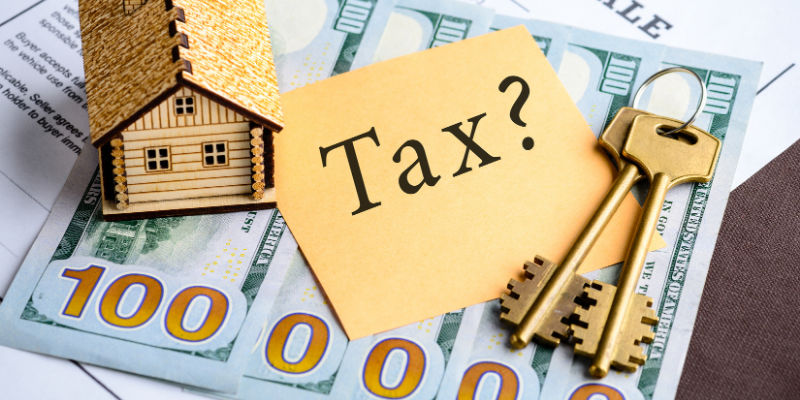
Essential Tax Considerations for Home Sellers in St. Paul, MN
When selling a home in St. Paul, MN, understanding the essential tax considerations is crucial to navigating the process smoothly and avoiding unexpected liabilities.
Home sellers need to be aware of potential capital gains taxes that may apply if their property’s sale price exceeds the original purchase price plus any substantial improvements made over time. The IRS offers an exclusion for primary residences, allowing single filers to exclude up to $250,000 and married couples up to $500,000 of the gain from taxation, provided they meet specific ownership and residency requirements.
It’s also important for sellers to keep detailed records of all transactions and improvements related to the property, as these documents can be vital when calculating taxable gains and proving eligibility for exclusions. Additionally, Minnesota state taxes must be considered alongside federal obligations; understanding local tax codes ensures compliance with both state and municipal regulations.
Consulting with a tax professional familiar with real estate transactions in St. Paul can provide valuable guidance tailored to individual circumstances, helping sellers make informed decisions throughout the selling process.
Understanding Capital Gains Tax on Property Sales
When selling a home in St. Paul, MN, it is essential to be aware of how capital gains tax after selling a house can affect your overall profit. This tax applies to the earnings made from the increase in your property’s value since the time of purchase.
To determine your capital gain, calculate the difference between the selling price and your property’s adjusted basis, which includes the original purchase price plus improvements, and subtract any depreciation claimed over the years. In St. Paul, as part of Minnesota’s tax regulations, you need to consider both federal and state tax obligations.
The IRS offers an exclusion for homeowners who have lived in their home for at least two out of the last five years before selling; single filers can exclude up to $250,000 in profits, while joint filers can exclude up to $500,000. However, if you do not meet these requirements or sell a second home or investment property, you will likely face capital gains taxes.
K&G Investments can help you understand how to prepare for these tax implications and assist with navigating your real estate sale. It’s essential to keep detailed records of all transactions related to your home’s purchase and improvements to accurately calculate your potential taxable gain when you decide to sell your property in St. Paul. Understanding these rules ensures that you’re prepared for any tax liabilities associated with your real estate transaction.
Key Tax Implications of Selling a House in Minnesota
When selling a house in St. Paul, Minnesota, understanding the key tax implications is crucial for homeowners.
In this state, sellers need to be aware of potential capital gains taxes that may arise from the sale of their property. If the home has significantly appreciated in value since its purchase, the seller might incur capital gains tax on the profit made.
However, federal exemptions exist that can reduce or eliminate this tax if certain conditions are met, such as having lived in the home for at least two out of the last five years. Additionally, Minnesota does not impose a separate state-level capital gains tax but requires reporting of any taxable gain on state income tax returns.
Sellers should also consider potential deductions for expenses such as real estate agent commissions and closing costs, which can offset taxable income. Engaging with a knowledgeable tax advisor familiar with Minnesota’s specific regulations can help ensure compliance and optimize financial outcomes during the home-selling process in St. Paul.
Strategies to Minimize Taxes When Selling a Home
When selling a home in St. Paul, MN, it’s important to consider strategies that can help minimize your tax liabilities.
One effective approach is taking advantage of the home sale exclusion, which allows homeowners to exclude up to $250,000 of capital gains from taxable income if they are single, or up to $500,000 if married and filing jointly, provided they meet ownership and use tests. Ensuring that you have lived in the home for at least two out of the five years preceding the sale is crucial.
Additionally, keeping thorough records of any home improvements can be beneficial since these costs can increase your property’s cost basis and reduce taxable gains upon sale. Timing the sale strategically to align with lower-income years might also help keep you in a lower tax bracket.
Consulting a knowledgeable tax advisor familiar with St. Paul’s real estate market can further assist in navigating state-specific regulations and identifying additional deductions or credits applicable to your situation. Reach out to us for personalized support and guidance.
Legal Obligations for Paying Taxes on Property Sales

When selling a home in St. Paul, MN, homeowners must navigate several legal obligations related to paying taxes on property sales.
Understanding these tax responsibilities is crucial to ensure compliance with both federal and state regulations. In Minnesota, sellers may be subject to capital gains tax if the profit from the sale exceeds certain thresholds.
It’s important for sellers to determine their cost basis and any applicable exemptions, such as the primary residence exclusion, which can reduce taxable gains if specific criteria are met. Additionally, homeowners should be aware of potential state income tax implications that might arise from the sale.
Consulting with a tax professional or real estate attorney familiar with Minnesota laws can help sellers accurately calculate their tax liabilities and file necessary forms promptly. Staying informed about these legal obligations ensures a smoother transaction process and avoids unexpected financial penalties associated with non-compliance in property transactions in St. Paul.
The Role of Capital Improvements in Reducing Tax Liability
It is very important to know how capital improvements affect tax liability when selling a house in St. Paul, MN. Capital improvements, or capital expenditures, are defined as improvements that are made to a certain property that increase the value of the property, extend its useful life, or make the property usable for a different purpose.
These changes may include the installation of new roofs, improvements to the heating and cooling systems, or renovations of the kitchen and bathroom. These improvements are important because they help to increase the basis of the property, which is the purchase price and includes any expenses made to improve the property during the period of ownership. Homeowners are able to reduce the taxes that they have to pay on the sale of property by increasing the basis using capital improvements.
This is also the case in St. Paul and in the rest of the Minnesota region, which means that this approach to reducing taxable gain will subsequently lower capital gains tax. Sellers have to keep in mind that they must maintain all the relevant documents to prove the costs that they have claimed in relation to capital improvements.
Having appropriate documents guarantees that when estimating tax obligations associated with a sale, every relevant deduction is made. This prepares one not only to gain maximally but also to comply with the reporting standards set forth by the IRS for real estate transactions. In the context of selling a house, the knowledge of how capital improvements affect tax obligations enables homeowners to make well-informed decisions while selling their houses in the city of St. Paul.
Selling Investment Properties: Tax Rules and Regulations
Managing investment properties in St. Paul, MN, comes with specific tax obligations that need to be followed in order to have your financial obligations in order. Selling an investment property comes with specific taxation, and capital gains tax is one of them.
In the state of MN, both the federal and state governments impose taxes on capital gains. To estimate your liabilities and capital gains tax, the difference between the sales price of the property and the adjusted basis needs to be calculated. The adjusted basis is the original purchase price of the property with improvements added. Furthermore, St. Paul sellers need to be mindful of taxes that need to be paid on depreciation that has to be recaptured.
Property owners in St. Paul need to be mindful of 1031 exchange options that would defer capital gains taxes. A 1031 exchange is where capital gains taxes would be deferred if the proceeds were used to purchase similar property within a given period of time. Selling properties that are under should considerably reduce, and the property holder needs to plan to minimize depreciation impacts and taxes.
Working with a reliable St. Paul tax professional for real estate is highly recommended to ensure that all tax-related obligations are fully met while having extra time to handle other investment obligations.
Reporting Real Estate Transactions to the IRS Correctly
Understanding your responsibilities when selling a home in St. Paul, MN, especially with the IRS and the accuracy of your reporting, is critical.
As a homeowner, selling your primary home will definitely have some tax consequences. Each and every homeowner’s tax obligation will vary, including the amount of time spent living in the home, how long the home was owned, and the capital gains realized from the sale. Single homeowners may be eligible for an exclusion on capital gains up to $250,000. Married couples filing jointly may have the exclusion amount up to $500,000 if certain ownership and use tests are met.
However, accurate reporting is critical to avoiding penalties and audits. If reporting on Form 1099-S, there are minimum thresholds, so care also must be taken when reporting under the specified exemptions.
The additional seller obligations include the corroborative document keeping concerning the enhancement of the home’s basis value and the gross tax gain. These gains and the supporting documents will help in reducing the gains that are liable for tax. When reporting home sales to the IRS, the guidelines are provided for homeowners. For comprehensive and effective reporting of home sales, one must consult tax professionals who are conversant with the real estate tax laws in Minnesota.
Impact of Renovations on Home Sale Taxation
For homeowners planning to sell their property in St. Paul, MN, it is important to note the impact of renovations on taxation, especially if they seek to maximize profits while complying with tax obligations.
Renovations have the potential to change the tax liability on a home sale by increasing the basis, which is the value of the home at the time of sale. The basis is equal to the purchase price of the home, which is in addition to the capital improvements done over the years. The overall capital gain on the property is calculated by subtracting the relevant basis from the sale price.
In St. Paul, the basis is likely to be increased by the common improvements done, like bathrooms and kitchens, their remodel, and the addition of some features that cater to energy efficiency. All of these features add value to the house and lower the gain that is taxable at the time of sale.
Even though the renovations may increase the value of the property, not all improvements qualify. Tax planners and professionals explain that only rot-free and enduring changes that improve the value of the house, add to the structure’s life span, or are time-tested over the years count. The homeowners should retain all documents that detail the expenses of the renovations done and seek the advice of tax professionals who help with correct reporting to maximize the capital gains tax and benefit from the exemptions under the IRS statutes.
Long-term vs Short-term Capital Gains: What You Need to Know

While selling a home in St. Paul, MN, having an understanding of the long-term and short-term capital gains will help in managing your tax obligations optimally.
In the case that you have owned and occupied your home for over a year before selling, you will benefit from long-term capital gains tax, which is usually charged at a reduced rate when compared to short-term gains. Short-term capital gains apply when the asset is disposed of after being held for a period of one year or less. These short-term gains are taxed at a higher rate because they are taxed as ordinary income.
Understanding the difference between the two is vital to enable homeowners to manage the timing of selling their home for the best tax benefits. Moreover, the primary residence exclusion rule provides some lessors that may contribute towards tax-exempt gains for property held. These exclusions could exempt $250,000 of gain for single filers and $500,000 for married couples.
Understanding these things can help improve your overall tax strategies when selling properties in St. Paul.
Common Mistakes to Avoid When Filing Taxes After a House Sale
When selling a home in St. Paul, MN, it’s crucial to understand the tax responsibilities involved to avoid common mistakes that can lead to financial penalties.
One frequent error is failing to report the sale on your tax return, even if you believe you’re exempt from capital gains tax due to the primary residence exclusion. Many sellers mistakenly assume they don’t need to file any paperwork if their profit falls below the $250,000 threshold for single filers or $500,000 for married couples filing jointly, but it’s essential to correctly document the transaction and exclusions.
Another pitfall is neglecting to maintain thorough records of home improvements, which can significantly affect your cost basis and potentially reduce taxable gain. Additionally, overlooking state-specific tax obligations unique to Minnesota could result in unexpected liabilities; therefore, consulting with a local tax professional familiar with St. Paul regulations is advisable.
Furthermore, many homeowners miscalculate their taxable gain by not properly accounting for selling expenses like agent commissions and closing costs, which should be deducted from the sales price. Working with cash home buyers in St. Paul and nearby cities can also simplify the process and help reduce some of the financial complexities.
Being unaware of these intricacies can lead to errors when filing taxes after a house sale in St. Paul.
The 1031 Exchange: Deferring Taxes Through Property Swaps
When selling a home in St. Paul, MN, understanding tax responsibilities can be crucial, and one strategy to consider is the 1031 exchange.
This provision allows homeowners to defer capital gains taxes by reinvesting the proceeds from the sale of their property into a like-kind property. In essence, this means that instead of paying taxes immediately upon selling your home, you can defer them by purchasing another qualifying real estate property.
The key to a successful 1031 exchange lies in meeting specific criteria: the properties involved must be used for investment or business purposes rather than personal use, and strict timelines must be adhered to, including identifying potential replacement properties within 45 days and closing on the new purchase within 180 days.
By leveraging a 1031 exchange, sellers in St. Paul can potentially enhance their investment portfolio while deferring substantial tax liabilities. Residents considering this option should consult with a qualified intermediary who understands both federal tax law and Minnesota-specific regulations to ensure compliance and maximize benefits.
Effect of Local Property Tax Rates on Overall Profitability
When selling a home in St. Paul, MN, knowing the effect of local property tax rates is important for determining profitability.
It is important to understand that the local property tax rate impacts the net amount each seller is able to keep. For St. Paul, property taxes can be geographically more favorable. Sellers must pay attention to property taxes for the selling year and also any increase in value that is likely to happen in the coming years due to the home improvements, since that will determine the interest and final offers the buyers make.
High property tax rates can significantly curb demand, and the seller will be forced to make a sale at a considerable discount to compete. Understanding how these property tax rates are figured out is equally important since these have a bearing on the final capital gains taxation and thus must be precomputed for proper budgeting.
By incorporating local property tax rates in the selling price, one is able to make the tax net and thus increase the overall profitability that can be taken home and make positive and comfortable decisions during the selling process.
Hiring a Tax Professional for Real Estate Transactions Guidance

Selling a home in St. Paul, MN, comes with tax obligations that are complex and difficult for any one person to handle without the guidance of professional services.
An expert consultant on taxes offers deep knowledge on selling a property in St. Paul, especially in relation to local and federal tax regulations.
A tax consultant is familiar with the capital gains taxes and potential exemptions and is able to assist in the accurate reporting of the sale in the tax returns. Likewise, a tax consultant will appreciate the property laws in Minnesota and hence will provide tailored advice that will result in some savings.
This way, the homeowners will appreciate the value of a tax consultant, and with the right advice, they will not make costly, regrettable mistakes and will gain the assurance that their real estate fee transactions will comply with the laws. With this, the homeowners will appreciate better outcomes.
Do I Have to Pay Taxes When I Sell My House in Minnesota?
When selling a home in St. Paul, Minnesota, understanding your tax responsibilities is crucial to avoid unexpected financial obligations.
In Minnesota, whether you need to pay taxes on the sale of your home largely depends on certain conditions, such as capital gains exemptions and the duration of ownership.
If you’ve lived in St. Paul for at least two out of the last five years before selling, you may qualify for the federal capital gains tax exclusion, which allows single homeowners to exclude up to $250,000 of profit from taxation, while married couples can exclude up to $500,000. However, any profit exceeding these limits could be subject to capital gains tax.
Additionally, Minnesota does not impose a state-level transfer tax on home sales but does require sellers to consider potential property taxes and any prorated amounts due before closing the sale. Consulting with a local tax advisor or real estate expert who understands the nuances of Minnesota’s tax laws can provide valuable guidance tailored to your unique situation when selling a house in St. Paul. For a quicker and less complicated transaction, some homeowners choose to work with professional home buyers; we buy houses in Minnesota and nearby cities to avoid delays and streamline the closing process.
Who Pays the Deed Tax in Minnesota?
In the context of St. Paul real estate transactions, it is essential to understand who pays the deed tax. For both parties involved, the deed tax, or state deed tax (SDT), is usually the seller’s responsibility.
This tax forms an integral part of closing costs in real estate transactions. Minnesota has a deed tax of 33% of the sale price, meaning a seller pays $30 for each $1,000 sale. Thus, St. Paul sellers must pay the state deed tax, or SDT, prior to the closing of the sale, which affects the seller’s net profit.
During the home-selling period, it is advisable to work with a Minnesota-based real estate expert to ensure that all tax obligations for the home-selling process are free of ambiguity. This also includes all tax obligations that are to be handled by other parties. The earlier you start, the more predictable the closing process will be. Knowing all tax obligations is imperative to avoid surprises. No one wants the final tally of expenses to be more than expected.
Does MN Have a Capital Gains Tax on Real Estate?
If you are considering selling a house in St. Paul, MN, it is important to know how the state taxes real estate capital gains in St. Paul.
In the state of Minnesota, any capital gains profits made from selling property undergo federal and state taxation. Selling your house comes along with profits, for which the IRS requires you to report and pay a federal tax on it, capital gains taxation, in accordance with your tax bracket.
In the case of Minnesota, the state capital gains are regarded as income, which is taxed like any other revenue in Minnesota on its income tax brackets. In the case of selling a home, capital gains taxes can be mitigated by other exemptions that are available.
If you have lived in your house for at least two years within the last five years, then you can claim a federal capital gains tax exclusion of $250,000 for a single person and $500,000 for married couples filing together. Homeowners are advised to seek the services of certified tax experts and estate planners who are well-versed in the Minnesota taxation policies to accurately maximize the capital gains tax savings on real estate transactions.
How to Get Out of Capital Gains Tax on House Sale?
If you’re planning to sell your home in St. Paul, MN, knowing the methods that help avoid capital gains tax is important so that you can realize maximum profit.
Utilizing the IRS’s primary residence exclusion is one of the ways to avoid capital gains tax. This is a provision under tax law that permits the exclusion of up to $250,000 for individual filers and $500,000 for those married and filing jointly. It is important to remember that to benefit from this exclusion, you have to have owned the property and lived in it as a primary home for two out of the last five years prior to the sale.
Reinvesting proceeds from one home into a new home through a 1031 exchange is another way to minimize capital gains tax, although 1031 exchanges are usually done on investment properties and not primary residences. Another option would be selling your home at a specific time, or you could potentially adjust the date of sale and account for changes in tax law or personal factors that would impact your tax obligations.
A tax planner can provide strategies and options best suited for your needs while also ensuring compliance with real estate transaction laws that are specific to Minnesota.
Would you like to sell your house? Maybe you prefer to sell fast with minimal repairs or no stress. K&G Investments can help. We take care of everything and provide timely cash offers, ensuring no hidden details or offers. Have any questions or want to sell? Call us at (612) 400-8070 for a no-obligation offer. Get started with us today!
Helpful St. Paul Blog Articles
- How To Successfully Sell Half Of Your St. Paul, MN, Home
- Maximize Your Home Sale In St. Paul, MN
- Selling Your St. Paul, MN, Home Amidst A Pending Lawsuit
- How To Sell Your House And Still Live In It: A Guide For St. Paul, MN
- How To Successfully Sell Half Of A Duplex In St. Paul, MN
- Eviction Timeline In St. Paul, MN: A Guide For Landlords And Tenants
- Understanding Tax Responsibilities When Selling A Home In St. Paul, MN
- Understanding The Timeframe To Sell A House In St. Paul, MN
- Effective Strategies For Selling A Flood-damaged House In St. Paul, MN
- Selling Your St. Paul, MN, Home After 3 Years Without A Realtor

| HOME MORTGAGE | FIRST MORTGAGE | MORTGAGE | MORTGAGE LENDING | MORTGAGE LENDER | MINNESOTA DEPARTMENT OF REVENUE |
| REVENUE.STATE.MN.US | ASSET | REALTORS | MONEY | DATA | REAL PROPERTY |
| LIENS | INSURANCE | CAPITAL ASSET | TAX BRACKETS | REVENUE | LEGAL OWNERSHIP |
| LENDER |
